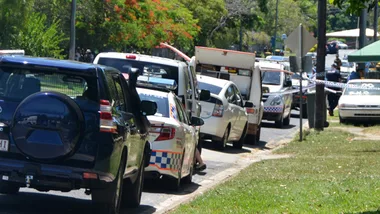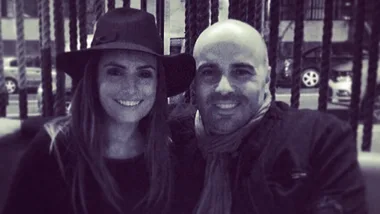Samantha Goode was 19 weeks pregnant when a four-wheel drive smashed into her scooter. Miraculously, she and her baby survived but a medical emergency just five weeks later left her fighting to live a normal life.
For the past year, Samantha Goode has suffered crippling anxiety attacks. They come almost daily and leave her emotionally exhausted and frequently housebound.
But even in the safety of her home on NSW’s Central Coast, Samantha can’t escape the deafening sound of her own screams.
“I can still hear myself screaming as the four wheel drive slammed into me,” she says.
“I was driving my scooter to the train station as part of my early morning commute. I watched the car miss a stop sign … I couldn’t do anything except brace myself.
“People have questioned why I was on a scooter while pregnant. What they don’t know is that my GP gave me the okay to do so, and I was preparing to get off my bike as I started my third trimester.
“I was wearing all the safety gear one could wear – and I wasn’t the one breaking the road rules.”
Miraculously, Samantha and her unborn baby survived the crash, with the mother-to-be appearing to suffer nothing more than some painful grazes.
But five weeks later, it become apparent that Samantha’s injuries were far more serious than doctors initially suspected.
“I was in my bedroom when suddenly it felt as if my heart was going to explode,” she says. “I couldn’t catch my breath, all my limbs went numb … I was terrified.
“I was so weak I couldn’t call out for help, and had to wait, exhausted on the bed until my partner came home from walking our dog.”

Samantha Goode and her son Myles.
Samantha was rushed to hospital, where her heart rate was found to be dangerously high. She was diagnosed with a pulmonary embolism – or blockage of the main artery to the lung – caused by a blood clot that had developed after the accident and travelled from her injured leg to her heart and lungs.
It’s a critical condition and doctors told Samantha her baby might not survive the treatment she needed to save her life.
“I remember screaming at them that I didn’t care about my life – just the baby’s – and they told me that I was their priority,” she says.
For 24 hours, the baby’s life hung in the balance as Samantha was given high doses of blood thinners and oxygen to reverse the damage of the embolism.
“We survived – but the rest of my pregnancy was marred by constant monitoring, daily injections of blood thinners and intense anxiety,” Samantha says.
Four months later, Samantha was thrilled to deliver a healthy baby boy, Myles, who is now eight months old. But despite her joy, she has been unable to enjoy motherhood because she is crippled by fear.
“Since his birth I have suffered daily flashbacks to the crash, and have struggled to be alone with him because I am so scared I will have another embolism,” Samantha says.
“I have literally been down on my knees begging my partner to stay home from work, terrified that something will go wrong if I’m left alone with Myles.”
Samantha is telling her story to help people understand the ongoing effects of road accidents.
“While we hear about fatalities on our roads, we don’t hear as much about people who suffer in other ways after a crash,” she says.
“The driver who did this to me got away with a ‘failing to stop at a stop sign’ fine – that’s it. A year on and I am still struggling with my anxiety, and I am yet to get back onto a scooter.”
Samantha is slowly starting to enjoy motherhood, building up her confidence to be alone with her beautiful baby boy, and trust in her ability to look after him without help.
“There’s so much that goes wrong on our roads, for no other reason except people are rushing around. I want everyone to stop for a minute – pause and hesitate before causing another accident like mine.”



